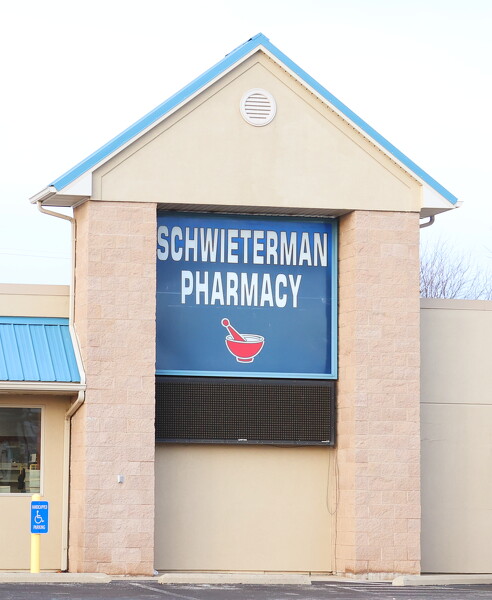
Owner Dale Bertke thanked employees and customers, some of whom had lifelong relationships with Schwieterman Pharmacy, following his announcement that all locations would close on Dec. 31.
Schwieterman Pharmacies will shutter its remaining locations in New Bremen, Minster and Coldwater on Dec. 31, ending a community-based approach to health care that dates all the way back to 1916.
The business, owned by Dale Bertke of Minster, made the announcement on its Facebook page this week, thanking patients and customers for their patronage over the last 108 years. Staff are helping customers transfer their prescriptions to other pharmacies.
Bertke attributed the forthcoming closure to the current climate of the community pharmacy business. The three local pharmacies together have 45 to 50 employees, according to Bertke, who began working for the business 46 years ago as a stock boy and a cashier.
"A lot of our customers have been with us from the day they were born until their final existence," Bertke told The Daily Standard. "This is hard. It's hard for them, it's hard for us, and it's not fair."
All pharmacies, not just the independents but the chain operations, too, are facing headwinds from pharmacy benefit managers (PBMs), who run prescription drug coverage for insurers, large employers and other clients, Bertke asserted.
For years, PBMs have been the target of ire for politicians, patients and others. But PBMs have said they play an important role in controlling drug costs and pass along most of the discounts they negotiate to their clients.
PBMs set up formularies, or lists of covered drugs, and negotiate rebates off the drug prices.
"They're underpaying what it costs us to buy the product in," Bertke said. "They're underpaying what it costs for the product and for the service that is being provided to dispense the product. There's no way that anybody can continue with this. Congress is working on something, but, you know, it's not moving fast enough."
Bertke said underpayment has been an issue for over a decade, as PBMs have sought to claw back more and more money for themselves.
"In the last year and a half to two years, it's been basically … what you used to get paid $10 for, you're getting maybe $1.10, and there's not enough margin there to continue to maintain the business," he said.
Plus, some PBMs own their own mail-order pharmacies, according to Bertke.
"It's been well-documented that they're paying them more than what they're paying us," he said. "It's been stated anywhere from 20 to 40 times what they're being paid. So if I'm being paid a dollar to fill a prescription, they're being paid $20. If I was being paid $20, I wouldn't be having this conversation with you today."
Asked how the situation got so bad, Bertke cited sheer greed and a lack of oversight.
"There are some regulations that control the PBMs, but really there's not a lot of regulation there," he said. "States have individually tried to do it. Arkansas has been one of them. Ohio has … been after it."
Ohio Attorney General Dave Yost said he is leading a bipartisan coalition of 39 attorneys general in urging members of U.S. Congress to engage in meaningful debate and reform of the current practices of PBMs.
"PBMs were originally intended to reduce the financial burden on Americans for prescription drugs, the reality today is starkly different," Yost said in a statement. "Instead of prioritizing the interests of patients, PBMs have shifted their focus to maximizing profits and marginalizing local pharmacies from the marketplace."
Bertke added that the Federal Trade Commission is investigating PBMs, too.
"(FTC) has subpoenaed them for documents, and they're not providing it, and they're pulling out every card that they can to prevent this from happening because they know that it will sink their ship once it's totally exposed," he said. "All that pharmacy is asking for is that there be a total transparency."
Bertke said he has personally taken up the issue with State Reps. Angie King, R-Celina, Susan Manchester, R-Waynesfield, and Tim Barhorst, R-Fort Loramie.
Barhorst and State Rep. Brian Stewart, R-Ashville, held a press conference April 25 to introduce House Bill 505, known as the Community Pharmacy Protection Act.
It would require PBMs to implement drug cost transparency measures to the superintendent of insurance, contracted insurers and plan sponsors, per a news release.
"He's trying to get (the bill) out of committee, get to a floor vote, but … for some reason it's being stonewalled right now," Bertke said. "So there are efforts being made."
However, 2024 was an election year, he noted.
"I don't say this to be mean to anybody, but … our elected officials were all focused on getting campaign dollars and getting reelected," Bertke said. "The issues that we have in front of the public were not a priority, unfortunately."
The problem with PBMs has been going on for years, and pharmacy deserts have since emerged all over Ohio, Bertke said, recalling a conversation he said he had with the aforementioned representatives.
"I had told them at that time that if I had to close our stores, there is nobody between Celina and Sidney," he said. "That's 42 miles, one way. The people in the middle of there are going to be devastated. They're going to have to travel 20-30 minutes to get to a pharmacy, one way, wait on their prescription and then travel back."
That scenario will now become a reality.
"This is not fair to them. This is not fair to the public," Bertke continued. "This is really denying public access to health care, and … this needs to be addressed. If you're in a big city, yeah, you can just maybe walk down three blocks and get your prescriptions. But that's not how it works in rural America."
Bertke said he's been bombarded with phone calls since the announcement to close was made.
"People were very generous, very thankful for our services over the years and I can't thank them enough for their patronage, but as we transition them over to another pharmacy … some of them are very upset with this because they don't know where to go and they don't know who to trust … and they're going to have to build relationships with new individuals, new pharmacists, new technicians and then go from there," Bertke said.
They are not, he pointed out, being directed to any specific pharmacy.
Schwieterman Pharmacies began serving Auglaize County in 1916 when Urban Schwieterman purchased the building and business in New Bremen from J.H. Hoffman, according to the company website. The New Bremen location is reportedly one of the longest running pharmacies in the country.
Schwieterman Pharmacies opened stores in Coldwater in 1973, St. Marys in 1988, Minster in 1989 and Wapakoneta in 1994. The Celina location closed in July 2021, followed by the St. Marys store in December 2021 and the Wapakoneta site on Nov. 22.
"I think we had a very good business," said Bertke, 62, who now plans to retire. "We served nursing homes, we did durable medical equipment … we've expanded and we've done a lot of things for the public and serviced them well. I've had a lot of good employees … over those years and I can't say thank you enough to them, and a huge thank you to our customers."
The Associated Press contributed to this story.
